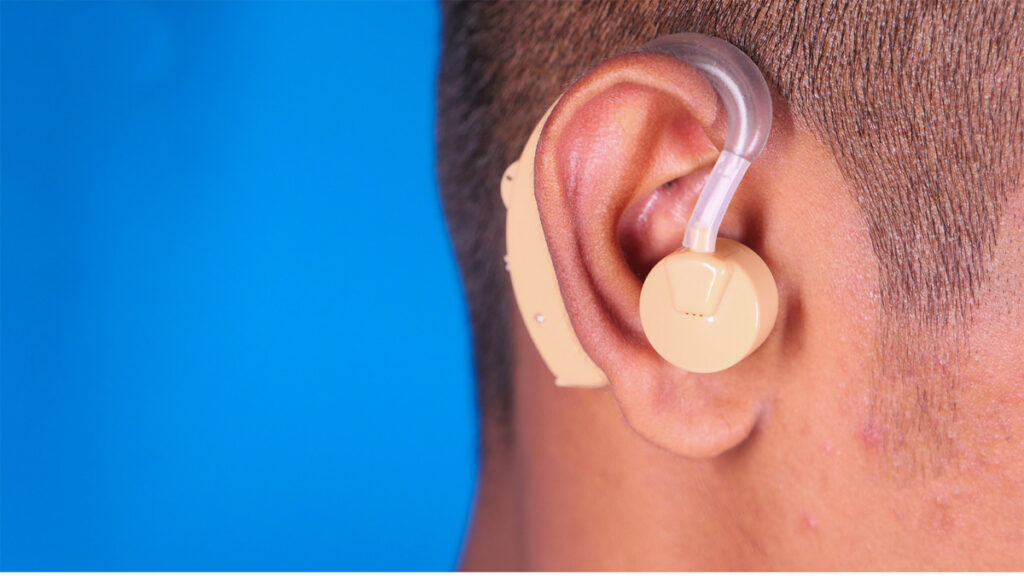One of the most commonly asked questions is “Will my hearing aid whistle? My Dad’s hearing aid was always squealing!” Feedback, whistling, or squealing was a common issue with hearing aids years ago.
What Is That Sound?
Hearing aid feedback occurs when sound that was supposed to go into your ear canal leaves your ear and goes back into the hearing aid microphone. The sound is then reamplified, and this causes your hearing aids to whistle.
There are different reasons for feedback to occur and sometimes it is normal. Your hearing aids might make a feedback noise when putting them in your ear in the morning until they are properly inserted or when someone is close to you and hugs you, pressing on your ear. This is perfectly normal because the hearing aids are reacting to the sound bouncing back from your surroundings.
It is normal to get some feedback if physically touching or cupping the ear or hitting the microphone directly. This is similar to touching a microphone you are speaking into and it makes a noise. The feedback should not happen randomly or when eating, chewing, talking, etc… Hearing aid feedback could also be a sign that something could be wrong with your hearing aids, or they need to be cleaned. In that case it’s best to consult your hearing care professional.
Fortunately, hearing aid technology has improved and has features that by performing a computerized feedback test can suppress the frequency areas that the squealing is likely to occur. The audiologist or hearing specialist will perform this test as part of the fitting. A well fit hearing device will have a good seal and not allow sound to escape creating a whistling noise. This may mean changing the size of the ear piece or creating a custom fit ear piece to find that well fit seal. One of the most common reasons for squealing is ear wax. A buildup of earwax can press against the earpiece and cause the squealing noise. I always encourage patients to come in and have an ear wax check if their hearing aid suddenly starts squealing.
Feedback occurs when the sound coming out of your hearing aid loops back around and goes into the hearing aid’s microphone. This squealing sound is caused by either excessive wax, drainage or a foreign object in the ear hitting the ear piece directly or an ill fitting ear piece lacking a proper seal. Earmold material can shrink over time, weight changes, and ear tissue changes can cause a poorly fitting mold. Open domes are often used allowing sound to leak through the holes. Depending on the hearing loss and shape of the ear the patient may benefit from a more closed off dome allowing less sound to escape.
What Is Hearing Aid Feedback?
Hearing aid feedback is what happens when the sound escapes the ear canal and hits the hearing aid microphone. It can sound like a squeal, screech, whistle, loud buzz or hissing noise.
Eliminating Hearing Aid Feedback
The audiologist or hearing specialist will first check the ear canal for wax or discharge. They will then evaluate the fit of the dome or mold and make sure it has a tight seal. The audiologist can program the hearing devices and perform a feedback measurement test. The earpiece can be changed out and the feedback test can be remeasured to access the fit. Adjustments can be made to hearing aid programming in frequencies most likely to cause feedback.
What Causes Feedback In Hearing Aids?
Top reasons for feedback in hearing aids include:
- Poor fit
- Ear Wax
- Turning the volume to high
- Broken microphone in the hearing aid
Modern hearing aids have a feature called Feedback canceller. The Audiologist will perform this test as part of the fitting. The test will assess the fit and seal of the ear piece and determine the frequencies that are most likely to cause feedback. The feedback cancellation uses a filter to put a cap on the amount of gain in the feedback frequencies. The audiologist can manually adjust the patient’s programming to ensure they are not being cut down too much to miss out on speech understanding.

